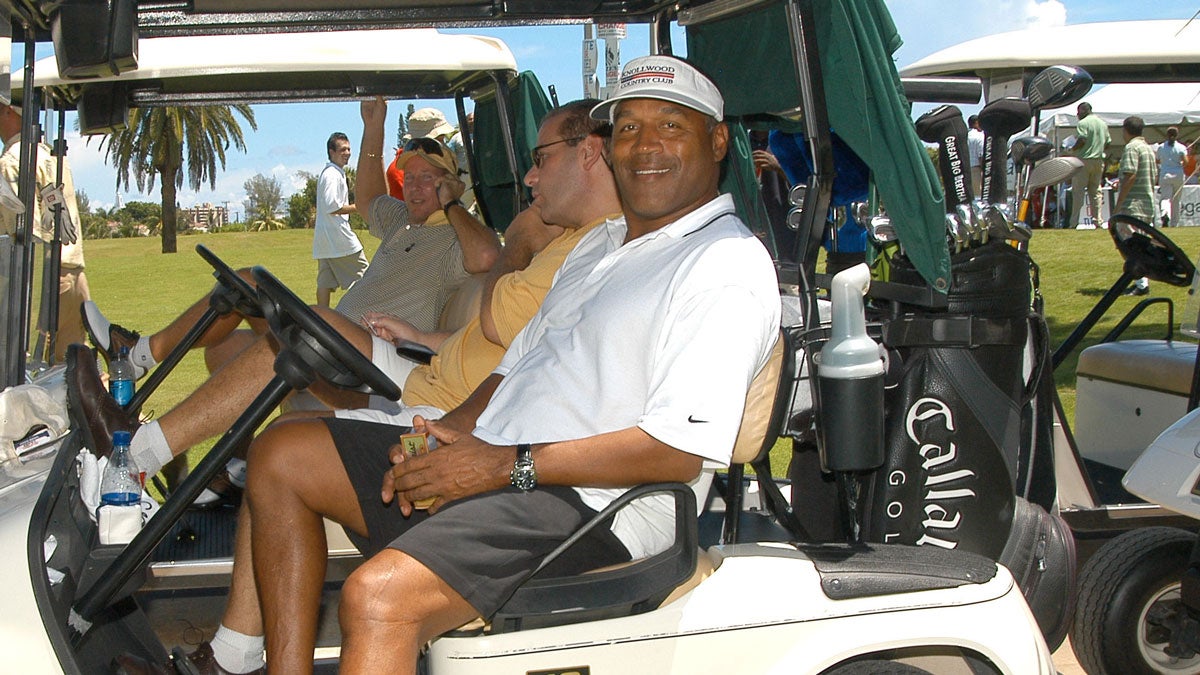AUGUSTA, Ga. — If O.J. Simpson ever played Augusta National there is no recorded history of it. But he was a member of Riviera, where he could break 80 on a good day. Simpson also was famously associated with Arnold Palmer, until he wasn’t.
That relationship ended on the day Palmer played his last U.S. Open round, deep in his backyard, at Oakmont, in Pittsburgh. Friday, June 17, 1994. It was about 100 degrees. Palmer shot a second-round 81 three-putting the last five greens. He spoke briefly and movingly to a tent filled with reporters. With the air-conditioning blasting, he had a white towel draped around his neck like a boxer’s corner man. He retired to the Oakmont men’s locker room, a half-dozen or so reporters in his wake.
Somebody asked Palmer about O.J. Simpson. The two sports icons — the most beloved golfer of all-time and one of the greatest backs in college and NFL history — were very much linked. They had done a long series of Hertz TV spots together from the mid-1980s on. They were great ads, their pitchmen running through airports like they were running through a backfield, putting on sunglasses to avoid airport crowds that were actually just trying to get to the Hertz counter. Palmer’s acting is wooden and ridiculous, which is why it worked. Simpson, a natural in front of the camera — who could forget his roles in the Naked Gun series? — was a natural, playing for the camera. Both men were so charismatic.
Palmer sat on a wooden locker room bench. Reporters stood around him. Somebody asked him about Simpson. The only part Palmer heard was the name.
This is not verbatim but close.
“Oh, he’s a great guy. We’ve had some much fun over the years, doing those commercials.”
The reporter briefly told Palmer about the unfolding news, that Simpson was, at that moment, in a white Ford Bronco, being driven by his friend Al Cowlings, on the 405 Freeway in Los Angeles, being chased, cautiously, by Los Angeles police, after failing to show up at an arraignment for a charge of murdering his ex-wife, Nicole Brown, and her friend Ronald Goldman.
Palmer look stunned, slightly confused and said, “Well, I never knew him that well.”
Simpson died Thursday, from cancer. He was 76. He was acquitted of the criminal murder charges. In a civil case, he was liable for wrongful death and ordered to pay $33.5 million in damages. He later served a prison sentence on a robbery charge.
All through Simpson’s turbulent, post-playing career, documented in books and films, his obsession with golf was a constant. He played with Michael Jordan and Lawrence Taylor and, before his murder charges, numerous pro-ams. He was on the circuit. He played public courses, private courses, resort courses. Rick Reilly, the Sports Illustrated writer, wrote a piece for the magazine in 1997 that ran under the headline, Need a Fourth? The Public Course Has Become a Refuge for O.J. Simpson, Though Many Golfers Wish He Would Take His Game Elsewhere. Simpson was a regular at Rancho Park in Los Angeles in that period, with his membership at Riviera suspended. Reilly describes a smashed drive by Simpson and Simpson’s response to it: “Oh, I killed that one.”
In his later years, Simpson lived in Miami and played many of the city’s courses. Golf was his main preoccupation; in the final social-media video he posted before his death, he said, “I’ll be back on that golf course hopefully in a couple of weeks.” His connection to golf is macabre, to say the least, and deeply odd. He allegedly hid his bloody clothes and the knife that was a murder weapon in a golf bag. The knife was never found. One of the most memorable court-delivered lines from Simpson’s legendary defense lawyer, Johnnie Cochran, was, “If the glove doesn’t fit, you must acquit.” Over the next 30 years, innumerable golfers playing with Simpson noted the fit of his golf gloves.
Simpson’s obsessive interest in golf is a strange footnote in a life defined by athletic greatness and criminal and civil mayhem. Simpson was an obsessive, as many great athletes are. The old Hertz spots featured Arnold and O.J. are the picture of innocence. But they were just ads, meaningless and fleeting. Golf reveals people, at least to a point. Life reveals people, period.
Michael Bamberger welcomes your comments at Michael.Bamberger@Golf.com
